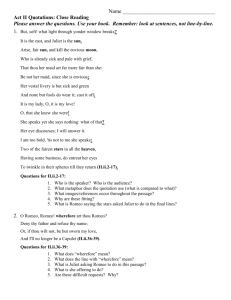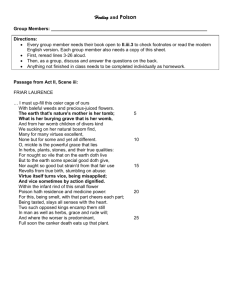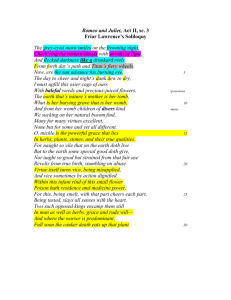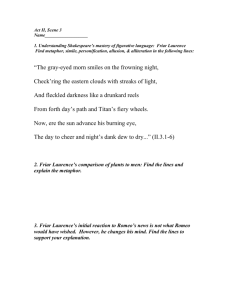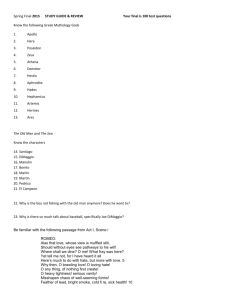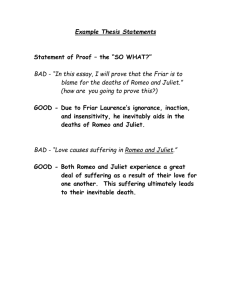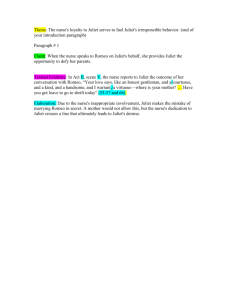II.iii Opposites
advertisement
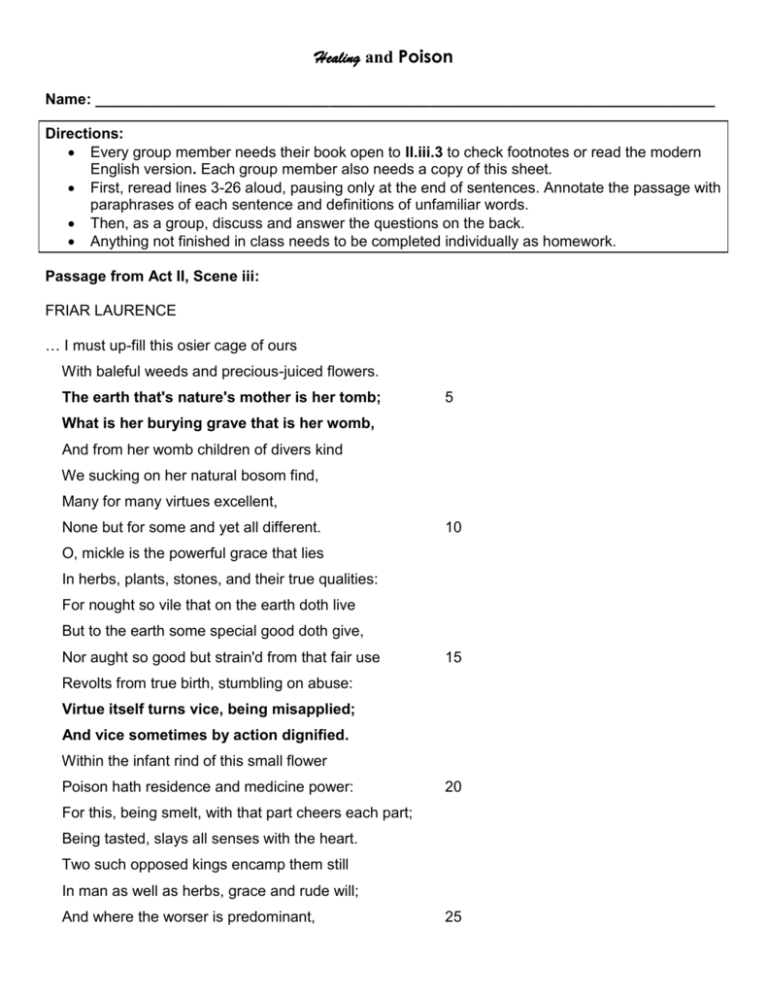
Healing and Poison Name: __________________________________________________________________________ Directions: Every group member needs their book open to II.iii.3 to check footnotes or read the modern English version. Each group member also needs a copy of this sheet. First, reread lines 3-26 aloud, pausing only at the end of sentences. Annotate the passage with paraphrases of each sentence and definitions of unfamiliar words. Then, as a group, discuss and answer the questions on the back. Anything not finished in class needs to be completed individually as homework. Passage from Act II, Scene iii: FRIAR LAURENCE … I must up-fill this osier cage of ours With baleful weeds and precious-juiced flowers. The earth that's nature's mother is her tomb; 5 What is her burying grave that is her womb, And from her womb children of divers kind We sucking on her natural bosom find, Many for many virtues excellent, None but for some and yet all different. 10 O, mickle is the powerful grace that lies In herbs, plants, stones, and their true qualities: For nought so vile that on the earth doth live But to the earth some special good doth give, Nor aught so good but strain'd from that fair use 15 Revolts from true birth, stumbling on abuse: Virtue itself turns vice, being misapplied; And vice sometimes by action dignified. Within the infant rind of this small flower Poison hath residence and medicine power: 20 For this, being smelt, with that part cheers each part; Being tasted, slays all senses with the heart. Two such opposed kings encamp them still In man as well as herbs, grace and rude will; And where the worser is predominant, 25 Full soon the canker death eats up that plant. Required Questions & Activity 1. Mark lines and words that show the positive and healing qualities of herbs and nature. You may simply draw a plus sign next to the word or highlight it in a certain color. If highlighting, mark these directions with color for positive. 2. Mark lines and words that show the deathly qualities of herbs and nature with a negative sign or with a different color highlighter. 3. Circle the parts of Friar Laurence’s monologue that show that positive and negative coexist. 4. How does Friar Laurence’s understanding of plants apply to the play and/or human nature as a whole? What else in the play is both poisonous and healing? What else in life? Name specific scenes and/or events. 5. Create an innovative diagram using words, symbols, and drawings that displays the examples of Healing and Poisonous elements of botanical and human nature in this scene and in the play as a whole. Include: Quotes from this passage Characters in the play Thematic words that could apply to the whole play A visual symbol or other element that shows that Healing and Poison are part of the same whole, not just opposites. Extra Honors Questions (or Standard Bonus) 6. What is the rhyme scheme of this monologue? 7. Why might Friar Laurence, as a spiritual guide and role model, speak in such strict rhyme? 8. Box the line towards the end of his speech that shows Friar Laurence using plants as a way to talk about human nature. 9. How can misapplied virtue become a vice? Give an example from your life or the world around you. How can vice become dignified by action? Give an example. 10. What does Friar Lawrence imply happens to the men who have “predominant[ly]” “rude will”? Age and Youth Name: __________________________________________________________________________ Directions: Every group member needs their book open to II.v.1 to check footnotes or read the modern English version. Each group member also needs a copy of this sheet. First, reread lines 1-2 and 9-39 aloud, pausing only at the end of sentences. Annotate the passage with paraphrases of each sentence and definitions of unfamiliar words. Then, as a group, discuss and answer the questions on the back. Anything not finished in class needs to be completed individually as homework. Passage from Act II, Scene v: JULIET NURSE The clock struck nine when I did send the nurse; 1 I am a-weary, give me leave awhile: In half an hour she promised to return. . . . Fie, how my bones ache! what a jaunt have I had! Now is the sun upon the highmost hill 25 9 Of this day's journey, and from nine till twelve JULIET Is three long hours, yet she is not come. I would thou hadst my bones, and I thy news: Had she affections and warm youthful blood, Nay, come, I pray thee, speak; good, good nurse, She would be as swift in motion as a ball; speak. My words would bandy her to my sweet love, And his to me: 15 NURSE But old folks, many feign as they were dead; Jesu, what haste? can you not stay awhile? Unwieldy, slow, heavy and pale as lead. Do you not see that I am out of breath? 30 Enter NURSE and PETER O God, she comes! O honey nurse, what news? JULIET Hast thou met with him? Send thy man away. How art thou out of breath, when thou hast breath To say to me that thou art out of breath? NURSE Peter, stay at the gate. 20 Exit PETER The excuse that thou dost make in this delay Is longer than the tale thou dost excuse. JULIET Is thy news good, or bad? answer to that; Now, good sweet nurse,--O Lord, why look'st thou Say either, and I'll stay the circumstance: sad? 35 Let me be satisfied, is't good or bad? Though news be sad, yet tell them merrily; If good, thou shamest the music of sweet news NURSE By playing it to me with so sour a face. Well, you have made a simple choice; you know not how to choose a man: Romeo! no, not he. 39 Required Questions & Activity 1. What does Juliet say about “old folks” (II.v.16)? What plot point leads her to think this? 2. Box a sentence or phrase Juliet says that shows her annoyance with the elderly. Explain your reasoning in the margin. 3. Box a sentence or phrase the Nurse says that shows she looks down on Juliet’s choices as “uneducated” or “naïve.” Explain your reasoning in the margin. 4. How does the tension between age and youth apply to the theme of the play and/or life as a whole? When else in the play do you see a tension between age and youth? Where else in life? Name specific scenes and/or events. 5. Create an innovative drawing or diagram using words, symbols, and drawing that displays the examples of Age and Youth in this scene and in the play as a whole. Include Quotes from this passage Characters in the play Thematic words that could apply to the whole play Extra Honors Questions (or Standard Bonus) 6. How does Juliet’s way of speaking reveal her youth, energy, and unknowingness? Consider sentence length, repetition of words or phrases, word choice, and what she speaks about. Highlight the youthful phrases and explain your choices in the margin. 7. How does the Nurse’s way of speaking reveal her age? Consider word choice, sentence length, and what she speaks about. Highlight to aged phrases in another color and explain your choices in the margin. 8. Only one couplet rhymes in this scene. Box the rhyming couplet. What is so special about this line that Shakespeare made it one of the only to rhyme in the scene? Moderate and Passionate (Lovers) Name: __________________________________________________________________________ Directions: Every group member needs their book open to II.vi.3 to check footnotes or read the modern English version. Each group member also needs a copy of this sheet. First, reread lines 3-15 and 31-35 aloud, pausing only at the end of sentences. Annotate the passage with paraphrases of each sentence and definitions of unfamiliar words. Then, as a group, discuss and answer the questions on the back. Anything not finished in class needs to be completed individually as homework. Passage from Act II, Scene vi: ROMEO Amen, amen! but come what sorrow can, It cannot countervail the exchange of joy That one short minute gives me in her sight: Do thou but close our hands with holy words, Then love-devouring death do what he dare; It is enough I may but call her mine. FRIAR LAURENCE These violent delights have violent ends And in their triumph die, like fire and powder, Which as they kiss consume: the sweetest honey Is loathsome in his own deliciousness And in the taste confounds the appetite: Therefore love moderately; long love doth so; Too swift arrives as tardy as too slow.* … JULIET (after Romeo asks her to declare her love for him in words) Conceit, more rich in matter than in words, Brags of his substance, not of ornament: They are but beggars that can count their worth; But my true love is grown to such excess I cannot sum up sum of half my wealth. * To understand this line, think about the moral of the story about the race between the Turtle and the Hare: “Slow and steady wins the race.” Required Questions & Activity 1. Mark the words, phrases, or expressions Romeo and Friar Lawrence say that show or describe passionate love. You may simply draw a symbol next to the word or highlight it in a certain color. Mark your symbol or your highlighting color in the space below. 2. With a different symbol or with a different color, mark the words and phrases Juliet and Friar Lawrence say that show or describe moderate, slow love. Mark your symbol or color in the space below. 3. Romeo, generally a passionate lover, and Juliet, generally a moderate lover, are attracted to each other. How do these types of relationships normally work out? How do Romeo and Juliet’s attitudes towards love lead to their own “violent ends” in the plot? 4. Create an innovative diagram using words, symbols, and drawings that shows Moderate and Passionate in this passage and the play as a whole. Include Quotes from this passage Characters in the play that could be considered either Moderate or Passionate (doesn’t have to be about love) Thematic words that could apply to the whole play Extra Honors Questions (or Standard Bonus) 5. What does Romeo say he will give up for “one short minute in [Juliet’s] sight”? 6. What are some examples of the “violent delights” Friar Lawrence mentions? There is more than one possible answer. 7. Again, Juliet withholds from joining in Romeo’s flowery expressions of love. When else in the play does she do this? Find an exchange between Romeo and Juliet that shows him demanding her love and her telling him to slow down or hold up. Summarize the exchange below and give the Act, scene, and line numbers. Why does Juliet do this?
